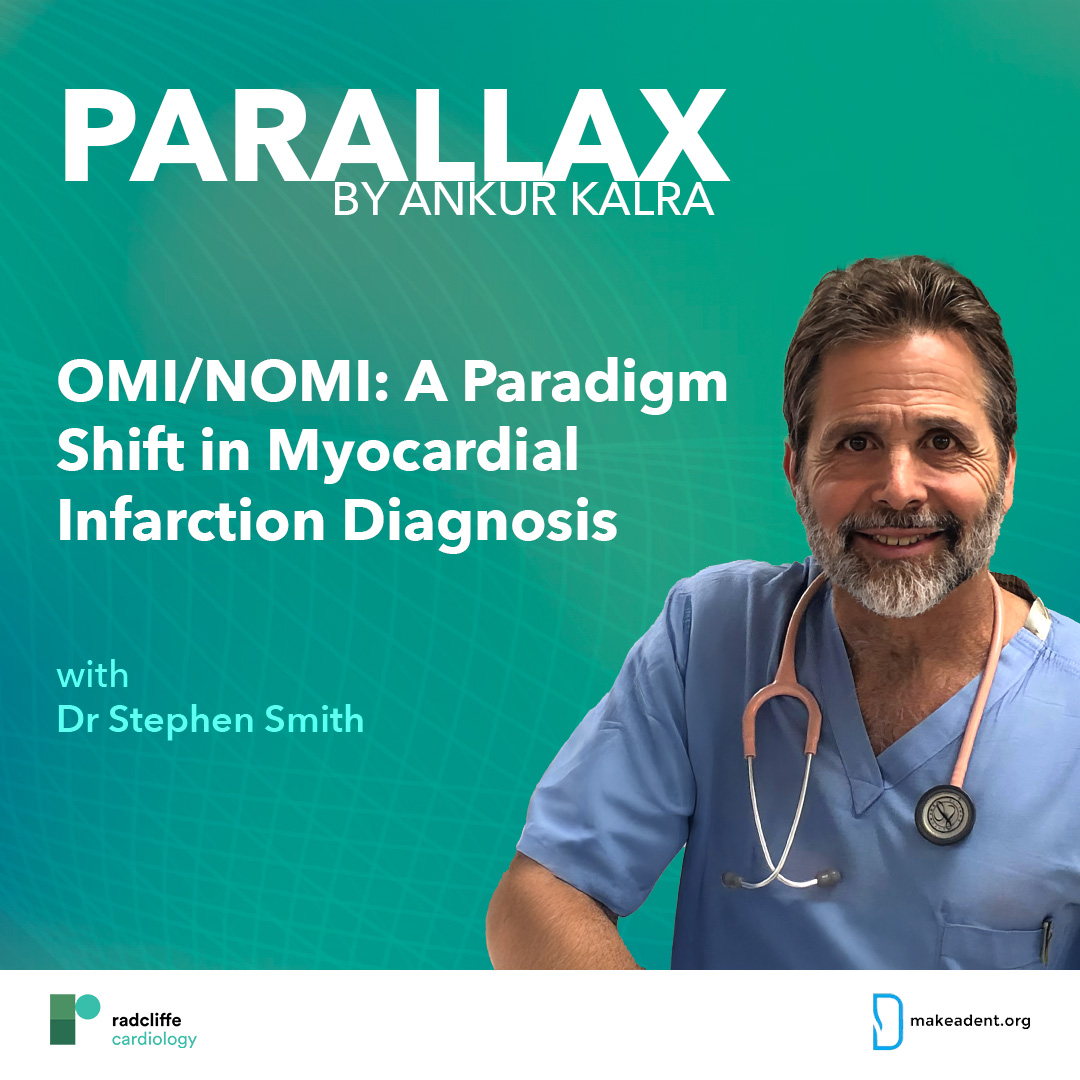
In this week's episode of Parallax, host Dr Ankur Kalra engages in a thought-provoking discussion with Dr Stephen Smith, a pioneer in electrocardiography and myocardial infarction diagnosis. They delve into the groundbreaking OMI/NOMI paradigm (Occlusion MI vs Non-Occlusion MI), challenging the traditional STEMI vs non-STEMI terminology that has long been the cornerstone of acute coronary syndrome management.
Dr Smith presents compelling evidence highlighting the limitations of ST-elevation as a marker for acute coronary occlusion, discussing his recently published review paper: "From ST-Segment Elevation MI to Occlusion MI: The New Paradigm Shift in Acute Myocardial Infarction".
The conversation explores the proposed shift to the OMI/NOMI terminology and the specific ECG criteria for diagnosing occlusion MI. Dr Smith discusses the challenges in disseminating this new paradigm and teaching these refined ECG interpretation skills to clinicians. Dr Kalra and Dr Smith explore exciting developments in AI-assisted OMI detection and ongoing studies aimed at validating the OMI/NOMI approach.
How can clinicians effectively implement the OMI/NOMI criteria into daily practice? What challenges exist in teaching these new ECG interpretation skills, and how can they be overcome? What advice does Dr Smith have for our listeners?
Sources:
McLaren J, et al. From ST-Segment Elevation MI to Occlusion MI: The New Paradigm Shift in Acute Myocardial Infarction. J Am Coll Cardiol Adv 2024;3:101314. DOI: 10.1016/j.jacadv.2024.101314.
Herman R, et al. Eur Heart J Digit Health 2023. International evaluation of an artificial intelligence–powered electrocardiogram model detecting acute coronary occlusion myocardial infarction. DOI: 10.1093/ehjdh/ztad010
Meyers HP, et al. IJC Heart & Vasculature 2021. Accuracy of OMI ECG findings versus STEMI criteria for diagnosis of acute coronary occlusion myocardial infarction. DOI: 10.1016/j.ijcha.2021.100767
Meyers HP, et al. J Emerg Med 2021. Comparison of the ST-Elevation Myocardial Infarction (STEMI) vs. NSTEMI and Occlusion MI (OMI) vs. NOMI Paradigms of Acute MI. DOI: 10.1016/j.jemermed.2020.10.026
Smith SW, Meyers HP. Ann Emerg Med 2023. Hyperacute T-waves Can Be a Useful Sign of Occlusion Myocardial Infarction if Appropriately Defined. DOI: 10.1016/j.annemergmed.2023.01.011
Meyers HP, et al. J Am Heart Assoc 2021. Ischemic ST‐Segment Depression Maximal in V1–V4 (Versus V5–V6) of Any Amplitude Is Specific for Occlusion Myocardial Infarction (Versus Nonocclusive Ischemia). DOI: 10.1161/JAHA.121.022866
Bischof JE, et al. Am J Emerg Med 2016. ST depression in lead aVL differentiates inferior ST-elevation myocardial infarction from pericarditis. DOI: 10.1016/j.ajem.2015.09.035
Smith SW, et al. Ann Emerg Med 2012. Diagnosis of ST Elevation Myocardial Infarction in the Presence of Left Bundle Branch Block using the ST Elevation to S-Wave Ratio in a Modified Sgarbossa Rule. DOI: 10.1016/j.annemergmed.2012.07.119
Meyers HP, et al. Am Heart J 2015. Validation of the modified Sgarbossa criteria for acute coronary occlusion in the setting of left bundle branch block: A retrospective case-control study. DOI: 10.1016/j.ahj.2015.09.005
Dodd KW, et al. Ann Emerg Med 2021. Electrocardiographic Diagnosis of Acute Coronary Occlusion Myocardial Infarction in Ventricular Paced Rhythm Using the Modified Sgarbossa Criteria. DOI: 10.1016/j.annemergmed.2021.03.036
de Alencar Neto JN, et al. Int J Cardiol 2024. Systematic review and meta-analysis of diagnostic test accuracy of ST-segment elevation for acute coronary occlusion. DOI: 10.1016/j.ijcard.2024.131889
de Alencar JN, et al. Br Heart J 2024. No false negative paradox in STEMI-NSTEMI diagnosis. Available at: https://scholar.google.com/citations?view_op=view_citation&hl=en&citation_for_view=ZBKuiKwAAAAJ:9wUeeRLfbNYC
Koyama Y, et al. Am J Cardiol 2002. Prevalence of coronary occlusion and outcome of an immediate invasive strategy in suspected acute myocardial infarction with and without ST-segment elevation. DOI: 10.1016/s0002-9149(02)02543-1
Khan AR, et al. Eur Heart J 2017. Impact of total occlusion of culprit artery in acute non-ST elevation myocardial infarction: a systematic review and meta-analysis. DOI: 10.1093/eurheartj/ehx418
Hung C-S, et al. Crit Care 2018. Prevalence and outcome of patients with non-ST segment elevation myocardial infarction with occluded "culprit" artery - a systemic review and meta-analysis. DOI: 10.1186/s13054-018-1944-x
Mehta SR, et al. N Engl J Med 2009. Early versus delayed invasive intervention in acute coronary syndromes. DOI: 10.1056/NEJMoa0807986
Kofoed KF, et al. Circulation 2018. Correction to: Early Versus Standard Care Invasive Examination and Treatment of Patients With Non-ST-Segment Elevation Acute Coronary Syndrome: VERDICT Randomized Controlled Trial. DOI: 10.1161/CIR.0000000000000640
Milosevic A, et al. J Am Coll Cardiol Cardiovasc Interv 2016. Immediate Versus Delayed Invasive Intervention for Non-STEMI Patients. DOI: 10.1016/j.jcin.2015.11.018
Lupu L, et al. Clin Cardiol 2022. Immediate and early percutaneous coronary intervention in very high-risk and high-risk non-ST segment elevation myocardial infarction patients. DOI: 10.1002/clc.23781

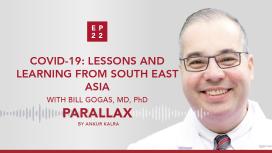
Hear Bill’s take on how East Asia responded to and successfully managed the pandemic and how they are now seeing a significant reduction in cases outside the epicentre. Hear how the strategy resulted in only 93 patients in Bill’s city of Nanjing, testing positive for coronavirus with a city population of 8 million.
Learn about effective responses, the importance of early control and how as a cardiovascular physician, your life and practice may be impacted by the virus.
Submit your question to Ankur via: podcast@radciffe-group.com.
Hosted by @AnkurKalraMD. Produced by @RadcliffeCARDIO.
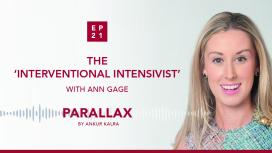
In this episode Ankur Kalra, MD meets with Dr Ann Gage, Cleveland Clinic’s first ‘interventional intensivist’. She discusses her unique skill set, what it means to be an interventionalist in the cath lab but also an expert in cardiovascular intensive care and advocates why such a unique skill set and critical care training are required in today’s modern medicine.
Listen to this engaging discussion between them on the challenges of being a woman in cardiovascular medicine today.
Submit your question to Ankur via: podcast@radciffe-group.com. Hosted by @AnkurKalraMD. Produced by @RadcliffeCARDIO.
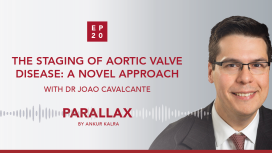
Listen to this, as well as an overview on his interesting childhood and his views on the future of cardiac imaging to treat TAVR.
Submit your question to Ankur via: podcast@radciffe-group.com. Hosted by @AnkurKalraMD. Produced by @RadcliffeCARDIO.
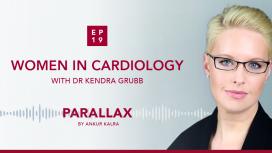
Her recent post on social media went viral. It was a photo of an all-women surgical team carrying out a complex structural heart procedure. It had over 100,000 views and was seen by people in over 75 different countries. It’s clear from this online reaction, that now is the time for women to be recognised for the work they are doing in medicine.
Listen to this engaging discussion between them on the challenges of being a woman in cardiovascular medicine today.
Submit your question to Ankur via: podcast@radciffe-group.com. Hosted by @AnkurKalraMD. Produced by @RadcliffeCARDIO.
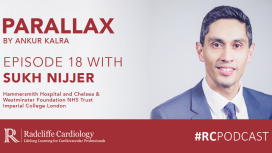
Trials discussed in detail include those presented at the ACC in New Orleans: PARTNER 3 & Evolut Low Risk on TAVR/TAVI, and SAFARI & COAPT on radial vs femoral access; presented at the ESC in Paris: THEMIS and ISAR-REACT 5 on DAPT post-PCI, DAPA-HF on SGLT2i’s for heart failure, and COMPLETE on PCI of non-culprit lesions in STEMI; presented at TCT in San Francisco: TWILIGHT on DAPT post-PCI, and EXCEL at 5 years on PCI vs CABG in left main CAD; and finally, presented at AHA in Philadelphia: ISCHEMIA on medical vs invasive approaches in ischemic events. Submit your question to Ankur via: podcast@radciffe-group.com.
Hosted by @AnkurKalraMD. Produced by @RadcliffeCARDIO.
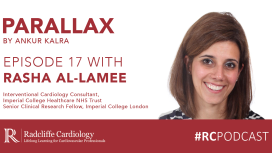
Ankur and Rasha also discuss the findings and unanswered questions of ORBITA, and how recent research in coronary revascularisation and stable ischemic heart disease has (or has not) changed their clinical practice. Finally, in anticipation of its presentation at AHA 2019, Rasha gives an overview of the International Study of Comparative Health Effectiveness with Medical and Invasive Approaches (ISCHEMIA). Submit your question to Ankur via: podcast@radciffe-group.com.
Hosted by @AnkurKalraMD. Produced by @RadcliffeCARDIO.
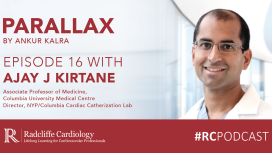
Ajay also talks about how he has negotiated between competing priorities in clinical and academic work, and how he manages fatherhood with a busy career. Ahead of the American Heart Association Scientific Sessions 2019, Ajay also shared what he thinks we can expect from the highly anticipate ISCHEMIA trial. Submit your question to Ankur via: podcast@radciffe-group.com.
Hosted by @AnkurKalraMD. Produced by @RadcliffeCARDIO.
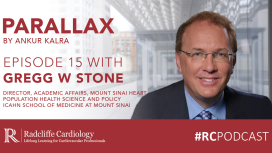
Gregg also shares his tips on how to progress from clinical practice to academic research, and what it takes to be a successful clinical investigator. Finally, Gregg shares with Ankur what personality traits he looks for in mentees and why presenting a final project is not enough. Submit your question to Ankur via: podcast@radciffe-group.com.
Hosted by @AnkurKalraMD. Produced by @RadcliffeCARDIO.
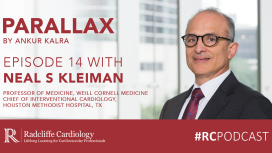
Digging more into the practicalities of everyday work-life, Neal reflects on the challenges of reporting to multiple bosses who have different goals, and how geography enabled him to move between cathlab and academia. Neal also shares what he looks for in early career academic cardiologists. Submit your question to Ankur via: podcast@radciffe-group.com.
Hosted by @AnkurKalraMD. Produced by @RadcliffeCARDIO.
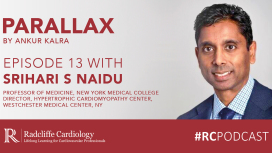
Ahead of TCT 2019, Ankur and Hari also talk about which trials presented in San Francisco they are most excited about! Submit your question to Ankur via: podcast@radciffe-group.com. Guest @SrihariNaiduMD.
Hosted by @AnkurKalraMD. Produced by @RadcliffeCARDIO.

Chest pain is one of the most common reasons for an emergency room visit in the US, with almost 6 million ER visits annually, yet there is no consensus on how to compare the results from various hscTn assays. Tune in to hear Santiago outline the advantages and limitations of using hscTn as a standard biomarket to evaluate patients with suspected ACS in the ER.
Hosted by @AnkurKalraMD. Produced by @RadcliffeCardiology.






